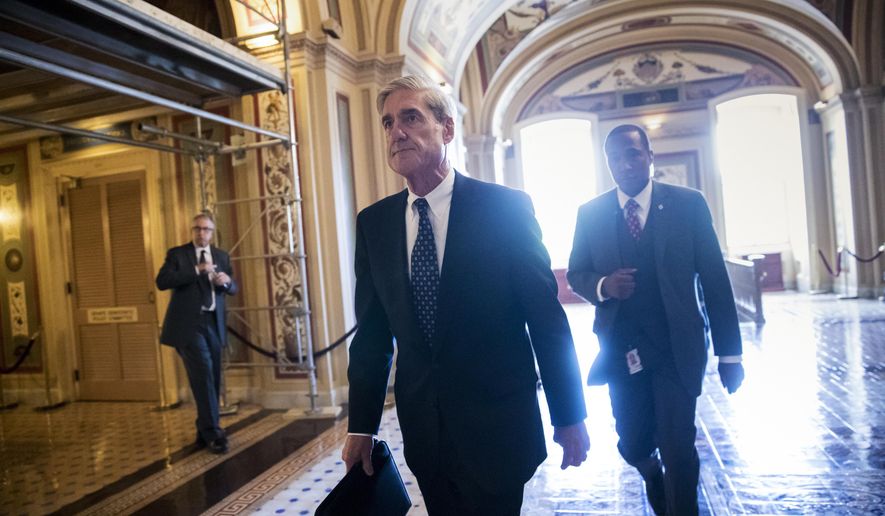Any move by special counsel Robert Mueller to go beyond collusion and obstruction of justice to probe possible money laundering by President Trump and his family could trigger a major constitutional clash — and present Congress with a massive political headache.
With nearly eight months gone by and some $7 million spent on Mr. Mueller’s Russia probe, speculation is mounting over when, whether and how the former FBI director might attempt to charge President Trump with a crime.
While sources say Mr. Mueller is “obsessed” with examining Mr. Trump’s network of business interests for potential money laundering infractions, there is a raging debate among legal scholars over whether that actually falls within the special counsel’s mandate.
That debate spilled into the open last week, when lawyers for Paul Manafort filed a lawsuit in U.S. federal court directly challenging Mr. Mueller’s legal authority to investigate and indict the former Trump campaign manager on pre-2016 money laundering charges.
The Manafort case could take months if not much longer to wind its way through the courts, and with that as a backdrop, several legal scholars told The Washington Times that any move by Mr. Mueller to pursue the money laundering and Mr. Trump’s personal finances would be on far shakier ground, and end up in the lap of Congress to adjudicate.
“The most important thing we do as a democracy is get together every four years to elect a president,” said Federalist Society co-founder Steven Calabresi, a law professor at Northwestern University. “And before the nation decides to overturn one of those elections, Congress will consider everything as it debates what sort of conduct is so harmful that it would justify doing that.”
Passing on to Congress criminal charges such as money laundering — and possibly triggering impeachment proceedings — would be driven by Mr. Mueller’s desire to sidestep the debate over whether a special counsel even has the authority to bring charges directly against a sitting president, the nation’s chief law enforcement officer, sources say.
Mr. Calabresi, who once clerked for conservative Supreme Court Justice Antonin Scalia, said Congress is exactly where charges against a sitting president should be debated.
But as the impeachment and Senate trial of President Bill Clinton proved two decades ago, the congressional debate would inevitably become contentious and partisan, and could spiral into unexpected directions.
Ronald Rotunda, who served as an adviser to independent counsel Kenneth W. Starr’s in the probe of Mr. Clinton and also worked on the investigative team during Watergate, said that the legal concept of “scienter” could play a key role.
Scienter, he explained, refers to “intent or knowledge of wrongdoing” — the concept that an offending party has knowledge of the “wrongness” or criminality of an act.
“In the case of holding Mr. Trump criminally accountable,” Mr. Rotunda said, “it would have to be proved that he individually approved or ratified criminal money laundering. But if one of his minions did, he would not be accountable.”
Sources close to Mr. Mueller have told The Times that that is what his investigators are currently attempting to determine. It could take months, years or never, another legal expert told the times.
Mr. Rotunda added, “To paraphrase Oliver Wendell Holmes Jr.: Even a dog distinguishes between being tripped over and being kicked. That is the question for Mueller — he will have to show that Mr. Trump himself knew of money laundering.”
Mr. Calabresi, who has long questioned the sweeping authority given to special counsels and special prosecutor, said Mr. Mueller’s team should be pressed on how any money laundering charge relates to the original mandate to investigate the charges of collusion and Russian meddling in the 2016 election.
“That’s another serious matter,” he said. “How is money laundering — which I do not think President Trump ever did — somehow connected to Mr. Mueller’s Russia probe?”
The debate over authority is unlikely to end even if, as some expect, Mr. Mueller turns over any findings on money laundering to lawmakers on Capitol Hill to act on as they wish. Many critics in Congress say they fear the special counsel has already exceeded his mandate.
But Mr. Calabresi said any Mueller referral to Congress “could also provide the nation an opportunity to witness a vigorous debate about something very big-picture and conceptual — the “criminalization of Mr. Trump’s politics.”
The Trump White House has long argued that suspicions of Russian collusion, and subsequent congressional and federal probes into the issue that have hung over the administration since its start, have been driven by Democratic Party and Obama-era appointed figures at the top of the Washington establishment seeking revenge for Hillary Clinton’s 2016 election loss.
Mr. Trump has repeatedly condemned the probe into collusion between his campaign and the Kremlin “a witch hunt” and “a hoax.”
For Mr. Calabresi and other skeptics, the expanded Mueller probe threatens to expand a trend where political opponents try to “criminalize” policy disagreements with their opponents.
“It’s an American tradition that we don’t send those we disagree with politically to the guillotine like they did in the French Revolution,” he said.
• Dan Boylan can be reached at dboylan@washingtontimes.com.




Please read our comment policy before commenting.